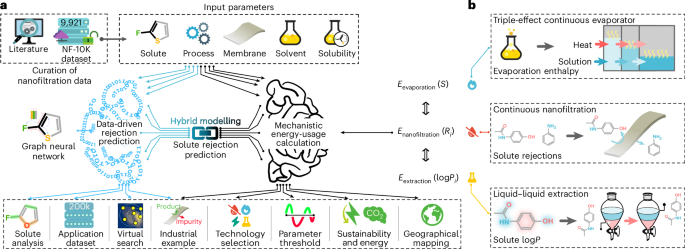从能耗和二氧化碳排放角度比较化学分离技术的混合建模方法
IF 49.7
1区 材料科学
Q1 ENERGY & FUELS
引用次数: 0
摘要
准确的化学分离能源系统建模是技术选择的重要组成部分,可最大限度地降低运营成本、能耗和排放。在此,我们报告了一种基于数据驱动和机械模型的混合建模方法,以全面比较化学分离性能。我们的模型可用于为给定的化学分离选择最合适的技术,如膜分离、蒸发、萃取或混合配置,通过训练机器学习模型,使用开放获取的膜数据集预测溶质排斥。我们估计,使用我们的方法,工业相关分离的能耗和二氧化碳排放量平均可减少 40%。我们预测并分析了多个工业部门的 710 万次溶质剔除。通过选择最高效的技术,制药纯化可实现高达 90% 的二氧化碳减排。我们绘制了全球二氧化碳排放量减少和运营成本降低的地图,建立了参数阈值,以方便企业和政府决策。本文章由计算机程序翻译,如有差异,请以英文原文为准。


A hybrid modelling approach to compare chemical separation technologies in terms of energy consumption and carbon dioxide emissions
Accurate energy system modelling of chemical separations is a critical component of technology selection to minimize operating costs, energy consumption and emissions. Here we report a hybrid modelling approach based on data-driven and mechanistic models to holistically compare chemical separation performance. Our model can be used to select the most suitable technology for a given chemical separation, such as membrane separation, evaporation, extraction or hybrid configurations, by training a machine learning model to predict solute rejection using an open-access membrane dataset. We estimated an average 40% reduction in energy consumption and carbon dioxide emissions for industrially relevant separations using our methodology. We predicted and analysed 7.1 million solute rejections across several industrial sectors. Pharmaceutical purification could realize carbon dioxide emissions reductions of up to 90% by selecting the most efficient technology. We mapped the reduction in carbon dioxide emissions and the reduction in operating costs globally, establishing parameter thresholds to facilitate corporate and governmental decision-making. Reducing the energy demands of chemical separations could help to decarbonize industry. Based on data-driven and first-principles modelling, here the authors report an approach to holistically compare and select optimal technologies for chemical separation.
求助全文
通过发布文献求助,成功后即可免费获取论文全文。
去求助
来源期刊

Nature Energy
Energy-Energy Engineering and Power Technology
CiteScore
75.10
自引率
1.10%
发文量
193
期刊介绍:
Nature Energy is a monthly, online-only journal committed to showcasing the most impactful research on energy, covering everything from its generation and distribution to the societal implications of energy technologies and policies.
With a focus on exploring all facets of the ongoing energy discourse, Nature Energy delves into topics such as energy generation, storage, distribution, management, and the societal impacts of energy technologies and policies. Emphasizing studies that push the boundaries of knowledge and contribute to the development of next-generation solutions, the journal serves as a platform for the exchange of ideas among stakeholders at the forefront of the energy sector.
Maintaining the hallmark standards of the Nature brand, Nature Energy boasts a dedicated team of professional editors, a rigorous peer-review process, meticulous copy-editing and production, rapid publication times, and editorial independence.
In addition to original research articles, Nature Energy also publishes a range of content types, including Comments, Perspectives, Reviews, News & Views, Features, and Correspondence, covering a diverse array of disciplines relevant to the field of energy.
 求助内容:
求助内容: 应助结果提醒方式:
应助结果提醒方式:


